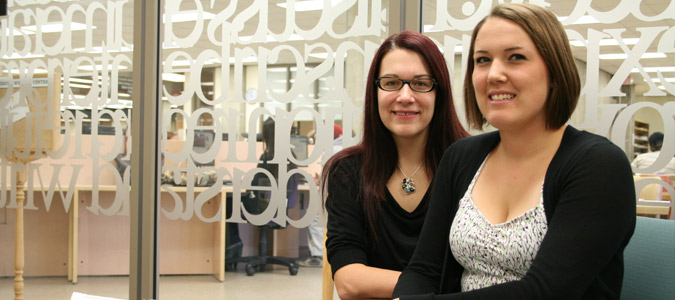Offering inmates the power of the pen
Having violent, high-risk criminals meet with professional writers and analyze the poetry of William Blake might not seem like something that would catch on. But for a University of Saskatchewan professor and grad student, their new creative writing program at the Saskatoon Provincial Correctional Centre (SPCC) is not only popular, it has a waiting list.
By Colleen MacPherson The program grew out of a writing workshop offered in early 2011 by Kathleen James-Cavan, associate professor of English, and one of her students, Dorian Geiger. Another professor and grad student saw value in the workshop and developed it into a program this past July.
The program grew out of a writing workshop offered in early 2011 by Kathleen James-Cavan, associate professor of English, and one of her students, Dorian Geiger. Another professor and grad student saw value in the workshop and developed it into a program this past July.Nancy Van Styvendale, assistant professor of English, and Allison Piché, MA candidate in Native Studies, co-taught two concurrent, eight-week creative writing workshops to inmates in both high and low security areas of the SPCC over the summer. The workshops were established with both moral and logistical support from Diann Block, SPCC's First Nations and Métis community and cultural co-ordinator.
After receiving unanimous positive feedback from inmates, Piché decided to offer the program again this fall.
"Right from the first classes that we offered, it was clear that this was something we would want to keep pursuing and eventually expand," explained Piché. "In the first week, we weren't going to assign any homework and they actually asked for it."
The two workshops, which run for one hour every week, are structured mainly around what the inmates indicate they would like to study. Over the summer, they wrote poetry, autobiographies and short stories. Some indicated a desire to study older English poetry, so one session focused on the work of Blake. Van Styvendale and Piché have also incorporated a guest speaker component into the workshops, with professional storyteller Simon Moccasin leading one of the summer sessions and author Tomson Highway heading up another this fall.
When Van Styvendale asked the inmates to come up with a name for the program, they chose Inspired Minds: All Nations Creative Writing.
"A large proportion of the inmates … at the correctional centre are Aboriginal, and that is reflected in the program. But, as the name indicates, it really is inclusive and open to anyone,"
she said.
Asked if there is any fear factor involved with delivering an educational program to criminals—many of whom are behind bars for violent offences—both Piché and Van Styvendale said intimidation has never been an issue.
"It's not the same as teaching at a university, obviously, but there is really no fear that comes into play for me," Van Styvendale said, adding that all men involved in the program are there voluntarily.
"The prison has things in place; you're supposed to wear a panic button, for instance. But what makes me feel secure is we have relationships established with the men that are built on respect. If anything, my assumption would be that they are probably more intimidated of us, coming from the university, than we have ever been of them."
While the inmates' writing is not graded, Piché and Van Styvendale provide feedback and offer to type and print their work, which is all handwritten due to computer restrictions in the facility. As for the quality of the writing, Van Styvendale said it often evokes a raw honesty that cannot be taught, but comes from the inmates' often tragic life experiences.
"Some of the work Allison and I have seen is just wonderful. The inmates have been really open and honest; many of them have a facility with language that I wouldn't have necessarily expected."
Piché first connected with Van Styvendale while enrolled in her Aboriginal literature graduate courses in 2010, and Van Styvendale now sits on her master's thesis committee.
Both are using the program to further their academic goals, as well. Piché will be using her experiences to help complete her thesis and, hopefully, put forth a compelling case for more widespread implementation of arts-based programming at correctional institutions across Canada. Van Styvendale plans to connect her work at SPCC to her SSHRC-funded research into community-based approaches to Aboriginal literature.
Van Styvendale and Piche are also editing a gang prevention book for youth with Str8 Up, an organization for former gang members, affiliated with the John Howard Society. The book will share the stories of inmates, some from the SPCC creative writing program, whose decisions to leave gangs will provide guidance for youth faced with the pressure to join. Van Styvendale and Piché are working one-on-one with the men to hone their stories for publication.
"A lot of these individuals have an interest in giving back to the community. That's a huge aspect of the program for many of the men who participate," said Van Styvendale. "They want to do outreach work with kids and help them make optimal decisions. If they are able to do that through writing down their thoughts and experiences, they see definite value in that."
Kirk Sibbald is a communications officer in the College of Arts and Science

